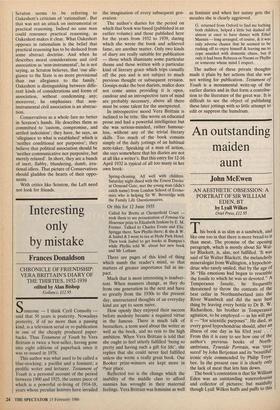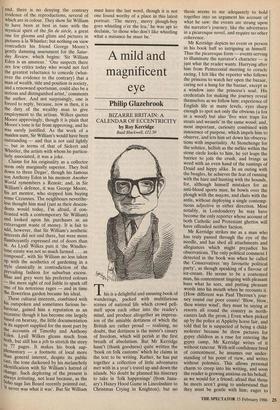An outstanding maiden aunt
John McEwen
• AN AESTHETIC OBSESSION: A PORTRAIT OF SIR WILLIAM EDEN, BT by Lyall Wilkes
Oriel Press, £12.95
This book is as slim as a sandwich, and like one too in that there is more bread to it than meat. The promise of the opening paragraph, which is mostly about Sir Wal- ter Blackett, is, alas, not fulfilled. 'It was said of Sir Walter Blackett, the melancholy mineralogist from Wallington, a hypochon- driac who rarely smiled, that by the age of 36 "His emotions had begun to resemble the fossils to which he was so devoted." A Temperance fanatic, he frequently threatened to throw the contents of the best cellar in Northumberland into the River Wansbeck and did the next best thing by leaving every bottle to Dr B. W. Richardson, his brother in Temperance agitation, to be employed — as his will put it — "for scientific purposes". He died, as every good hypochondriac should, after an illness of one day in his 83rd year . . • From this it is easy to see how one of the author's previous books of North- umbriana, Tyneside Portraits, was 'trea- sured' by John Betjeman and its 'beautiful ironic style commended by Philip Toyn- bee. In the present case it is clearly only the lack of meat that lets him down.
The book's contention is that Sir William Eden was an outstanding watercolounst and collector of pictures; but manfully though Lyall Wilkes huffs and puffs to this end, there is no denying the contrary • evidence of the reproductions, several of which are in colour. They show Sir William to have been at best in tune with the mystical spirit of the fin de siècle, a great one for glooms and glints and pictures in pictures a la Whistler; but nothing on view contradicts his friend George Moore's gently damning assessment for the Satur- day Review, which begins: 'Sir William Eden is an amateur.' One suspects there are few critics today who would not feel the greatest reluctance to concede (what- ever the evidence to the contrary) that a man of wealth, title and position in society, and a renowned sportsman, could also be a serious and distinguished artist,' comments the author. And not surprisingly, one is forced to reply, because, now as then, it is the duty of the wealthy man to give employment to the artisan. Wilkes quotes Moore approvingly, though it is plain that Moore's tone is far from approving; and he was surely justified. As the work of a maiden aunt, Sir William's would have been outstanding — and that is not said lightly — but in terms of that of Sickert and Whistler, the artists with whom he particu- larly associated, it was a joke.
Claims for his originality as a collector seem only marginally superior. They boil down to three Degas', though his famous son Anthony Eden in his memoir Another World remembers a Renoir; and, in Sir William's defence, it was George Moore, his art mentor, who stopped him buying some Cezannes. The neighbours neverthe- less thought him mad (just as their descen- dents would today, I'm afraid, if con- fronted with a contemporary Sir William) and looked upon his purchases as an extravagant waste of money. It is fair to add, however, that Sir William's aesthetic Interests did not end there, but were more flamboyantly expressed out of doors than III. As Lyall Wilkes puts it 'the Windles- tone estate was not so much farmed. . . as composed', with Sir William no less taken clP with the aesthetics of gardening in a Style classically in contradiction of the Prevailing fashion for suburban excess. Blue and grey were his preferred colours -- the mere sight of red liable to spark off one of his notorious rages — and in time the flowerless garden became his ideal.
These cultural interests, combined with his outspoken and sometimes furious be- haviour, gained him a reputation as an eccentric though it has become one largely based on hearsay, the little documentation al its support supplied for the most part by the accounts of Timothy and Anthony Eden. Lyall Wilkes gleans much from both, but still has a job to stretch the story to 77 pages. It makes his book sup- Plementary — a footnote of local more than general interest, despite its public Fast; the tone darkened by his melancholy Identification with Sir William's hatred of Change. Such deploring of the present is always irritating, not least because, as the S,.oho sage Ian Board recently pointed out, it never was what it was'. But Sir William must have the last word, though it is not one found worthy of a place in this latest portrait: 'The merry, merry plough-boy goes whistling o'er the lea,' he was apt to declaim, 'to those who don't like whistling what a nuisance he must be.'






































 Previous page
Previous page